Death Sentence
 for strong bloody brutal violence and pervasive language.
for strong bloody brutal violence and pervasive language.
Reviewed by: Bob MacLean
CONTRIBUTOR
| Moral Rating: | Extremely Offensive |
| Moviemaking Quality: |
|
| Primary Audience: | Adults |
| Genre: | Crime Action Drama Adaptation |
| Length: | 1 hr. 46 min. |
| Year of Release: | 2007 |
| USA Release: |
August 31, 2007 (wide—1,900 theaters) |
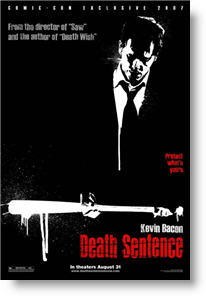

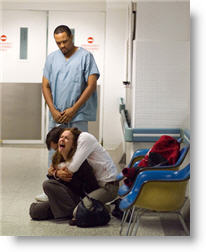
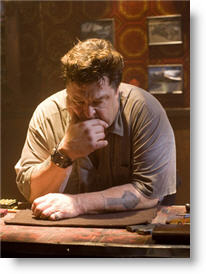

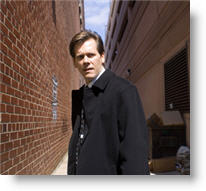





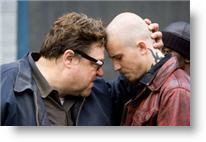

How do I know what is right from wrong? Answer
How does viewing violence in movies affect the family? Answer
Why does God allow innocent people to suffer? Answer
What kind of world would you create? Answer
What about the issue of suffering? Doesn’t this prove that there is no God and that we are on our own? Answer
Does God feel our pain? Answer
| Featuring |
|---|
|
Kevin Bacon Kelly Preston John Goodman Garrett Hedlund See all » |
| Director |
| James Wan — “Saw (2004),” “Saw III (2006),” “Dead Silence” (2007) |
| Producer |
| Ashok Amritraj, Howard Baldwin, Karen Elise Baldwin, Nick Hamson, Eric Mitchell, Nick Morton, Andrew Sugerman, Lars Sylvest |
| Distributor |
This film is based on a novel by Brian Garfield.
“Protect what you love”
The only reason I saw this movie was to be able to write a review to help in your viewing decision. This film could be categorized as typical action, violence, expletive-ridden and devoid of redeeming value, very similar to the category of its erstwhile predecessor, the “Death Wish” series featuring Charles Bronson. This movie, as you might guess, ups the ante. Apparently, the first of the 5 in that series almost never saw the silver screen, as it was perceived as too controversial and rejected by many studios before Paramount finally picked it up.
As a child, I found Charles Bronson became my hero in the excellent and enduring, “The Great Escape.” How disappointed I became in 1974 when he starred in “Death Wish.” Equally disappointing was Kevin Bacon’s character, Nick Hume, in “Death Sentence.” Bacon was so enjoyable in “Tremors,” “Apollo 13” and “My Dog Skip.” It isn’t that his acting was poor, rather his choice to play such a morally bankrupt character was unfortunate. Even more so because the film makes a definite point in a scene at his job that he wants to do the right thing because it’s the right thing. After that, however, it’s pretty much all down hill in his moral choices.
The story is rather predictable, and its unfolding and screenplay definitely deserve the R-rating. What was shocking at the theater I saw it at was that there were noticeable numbers of families with elementary aged and younger children in tow. I am particularly sensitive to what types of movies parents bring their children to see because of a dozen years I’ve spent mentoring neglected and abused children. Before bringing a child, consider seeing this on your own.
The story line is barely worth mentioning; if you’ve seen the trailer, it is too obvious. My guess is, if producers have a bland story, they believe they have to up the violence factor, if they want it to sell. The level of swearing is easily eclipsed by horrid violence throughout the latter half of the movie. After Hume contemplates his first murder, he is momentarily repulsed by the thought—and rightly so. Instead of turning around and returning to his family, he goes through with it. There are other plot aspects that are contradictory or just don’t make sense, but it isn’t worth going into, due to the overarching violence depicted throughout the second half. There are various other inconsistencies in the story, but they are not worth mentioning, as the grossness-rating of this film is so high they become lost in a morass of the thorough mess of it.
The story line is predictable and nearly becomes a horror movie in the twists the filmmakers try to mount in order to surprise the audience, abandoning any pretension of redeeming value. Without giving it all away, Bacon’s character, Hume, seeks revenge against killers, and I suppose the point of the movie might be taken that a person might go to any length to seek revenge and meet out justice himself, as was the case for the “Death Wish” films, as well as in this film. Admittedly, Hume might be seen as “protecting” his family, but what happens makes it all too obvious he has not only failed, but rather made the situation infinitely worse. Vengeance is mine (Rom. 12:19), God says, and He says it so it doesn’t end up eating you alive. Remember the phrase that revenge is like taking poison and expecting your adversary to die from it.
Specifically, it would have been more logical to list how many words in this film were not expletives rather than the other way around. Once the mayhem begins, there is barely a sentence not filled with cursings and four letter words. Once in awhile I noticed some aspect to a character that was exemplary, but the plot develops the character in a way that is diametrically opposed to that character trait. The Bible tells us to pursue wisdom at all costs, as if it were a valuable jewel. One aspect of wisdom is developing integrity and character. As previously mentioned, Bacon’s character exemplifies integrity early on in the story, but then descends deeply and predictably into a morally murderous sewer. One reason the Bible encourages us to pursue character is that when we develop it, it will be the best defense in deflecting and resisting temptation into amoral acts. Paul spends much of his time explaining this in his epistles to the saints across Asia Minor, Greece and Rome. People do not suddenly abandon character easily, any more than an Olympic skater can forget how to skate efficiently just because of some shock in their life.
One sad part of the story involves the resulting relationship of Hume to his younger son. His son’s grieving process should have affected him and drawn them together, but it does not—rather Hume continues on with his horrible plan. The saddest part is when the wife realizes, in aghast, what the husband has gotten himself and his family into—yet he persists. This is a good point to emphasize; if we realize we are involved in on-going sin, we can always back out and allow God to enter in and help stem the damage which we can do, by admitting what we are doing will damage, not just ourselves, but others. This is one of the worst aspects of sin, it will always affect others, because God designed us as social beings who gain our very identity by gleaning a little bit of it from everyone we come across throughout our lives. Our main character, however, does the opposite, as the Bible promises will happen if we allow our souls to become hardened (Heb. 3:13).
I won’t complain that movies are more violent, and that they are headed into new levels of depravity, nor that youth today are growing up on a diet of them to the extent that they see it as normal entertainment. I will just say we get what we deserve, we reap what we sow, Jesus was not kidding.
Violence: Extreme / Profanity: Extreme / Sex/Nudity: None


Extremely Offensive / 5
So naturally I assumed “Death Sentence” would be up to par. There will be a flood of negative reviews for this movie. Since I’m taking a neutral stance, I’ll omit my criticisms of “Death Sentence” because rest assured, someone else will share theirs. What I will say is I did like the movie for it’s worth. It doesn’t really fit into the action category—I think drama better suits it. Kevin Bacon plays his role well, and if you’ve seen the trailer, you know what to expect from his character. Don’t expect more; don’t expect less.
Offensive / 3½
Extremely Offensive / 1

My Ratings: Extremely Offensive / 4